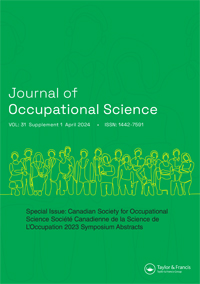Current issue
CANADIAN SOCIETY FOR OCCUPATIONAL SCIENCE (CSOS) OCCUPATIONAL SCIENCE SYMPOSIUM ABSTRACTS 2023
Register now or learn more

Start a new submission or continue a submission in progress
Go to submission siteReady to submit? Start a new submission or continue a submission in progress
Go to submission site (link opens in a new window)Aim
Journal of Occupational Science is dedicated to advancing knowledge of human occupation, broadly defined as the things people do that have meaning and occupy time and space. Its aim is to bring diverse voices into dialogue, with the ultimate goal of producing plural, well-informed insights that respect and center diverse ways of doing and knowing, generating real world responses to situations of inequality and oppression that restrict access to and benefits of occupation, and supporting responsive occupation-focused actions that promote health, well-being, and equity. In support of the aim to bring diverse voices into conversation, JOS works with authors to publish selected articles in dual languages (English/Portuguese, English/Spanish) and works with the publisher to provide abstracts in multiple languages on the journal website.Scope
The Journal of Occupational Science publishes articles that build understanding of occupation, which is understood to be a complex biological, cultural, spiritual, temporal, relational, political, and historically situated phenomenon. Humans are viewed as occupational beings, whose occupations shape the local and global environment, culture, society, themselves and others.
Occupation is viewed from multiple perspectives, and inquiries may examine a range of topics including occupation in context, its functions and outcomes, the human capacity for occupation, societal forms of occupation, its performance and meanings, issues of inclusion/exclusion from participation, and occupation’s reciprocal relationship with well-being, health, and ill-health. Studies of occupation at population, community, group, and individual levels are welcome, as are explorations of occupation in relation to lifespan development, adaptation, temporal and spatial patterns, societal structures and barriers, governance mechanisms, resistance, sustainability, and environmental impacts. Humanist, Indigenous, population, transactional, evolutionary, biological, ecological, historical, socio-political, philosophical, critical, and biographical perspectives of occupation will be considered.
Editorial policy
In line with the Journal of Occupational Science’s Pledge to Mobilize against Racism (Stanley et al., 2020, 2021) and efforts to decolonize its publishing practices, diverse approaches to generating and presenting knowledge are valued, including, for example, Indigenous, Decolonizing, Afrocentric, and global South methodologies.
All authors are asked to ensure that their work evidences the following practices:
Manuscripts addressing historically marginalized communities must evidence respectful engagement with the communities and people described in the inquiry. Engagement may involve:
Submission is online via ScholarOne Manuscripts - https://mc.manuscriptcentral.com/rocc
All submitted manuscripts are subject to initial appraisal and, if found suitable for further consideration, to peer review by independent referees. Manuscripts addressing historically marginalized communities that do not engage with the people(s) and knowledge(s) of those communities will be rejected without review. All peer reviews are double anonymized, ensuring author anonymity to the extent possible within a small field of inquiry.
Manuscript acceptance is based on the quality of methodologies and methods used to generate knowledge, clarity, conciseness, coherence of the presentation of knowledge, and ethical principles of integrity, minimization of harm, and mana* enhancing relationships and practices.
Keynote presentations to occupational science conferences and meetings are published by arrangement. Proposals for Special Issues are actively encouraged and can be made by contacting the Executive Editor at [email protected]
References
Stanley, M., Rogers, S., Forwell, S., Hocking, C., Nayar, S., Laliberte Rudman, D., Prodinger, B., Farias Vera, L., Townsend, E., Magalhaes, L., Simaan, J., Reid, H., & Pols, V. (2020). A pledge to mobilize against racism. Journal of Occupational Science, 27(3), 294-295. https://doi.org/10.1080/14427591.2020.1793446
For a translation into French, Portuguese, Spanish, Arabic, German, and Japanese, see:
Stanley, M., Rogers, S., Forwell, S., Hocking, C., Nayar, S., Laliberte Rudman, D., Prodinger, B., Farias Vera, L., Townsend, E., Magalhaes, L., Simaan, J., Reid, H., & Pols, V. (2021). A pledge to mobilize against racism - Translated. Journal of Occupational Science, 28(3), 388-397. https://doi.org/10.1080/14427591.2021.1921562
Note
* A Māori concept signifying status, prestige, power, influence, authority. Mana enhancing relationships and practices are respectful, beneficial, and mindful of the force that binds all people and the natural and spiritual world.
Authors can choose to publish gold open access in this journal.
Read the Instructions for Authors for information on how to submit your article.
Explore the most recently published articles
CANADIAN SOCIETY FOR OCCUPATIONAL SCIENCE (CSOS) OCCUPATIONAL SCIENCE SYMPOSIUM ABSTRACTS 2023
Occupation and society: Global to local perspectives for the future